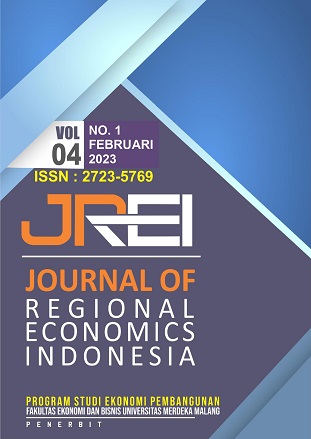Peran CSR Industri Perbankan dalam Upaya Menekan Kemiskinan dan Ketimpangan Sosial
DOI:
https://doi.org/10.26905/jrei.v4i1.10008Keywords:
CSR, Studi Kepustakaan, Ketimpangan, KemiskinanAbstract
Tujuan dari studi ini adalah untuk mengeksplorasi sejauh mana sektor swasta, terutama industri perbankan dalam berpartisipasi membantu pemerintah dalam mengurangi tingkat kemiskinan serta ketimpangan sosial di Indonesia dengan program corporate social responsibility (CSR). Studi ini menggunakan metode kepustakaan dan membandingkan hasil studi - studi yang telah dikaji sebelumnya. Data yang digunakan merupakan data sekunder yang didapat dari laporan pertanggungjawaban perusahaan pada tahun 2020. Hasil menunjukan bahwa beberapa perusahaan menerapkan program yang sama, dengan mengutamakan bantuan sosial, kesehatan, infrastruktur serta pendidikan melalui beasiswa dalam pelaksanaan program CSR nya. Melalui program tersebut diharapkan dapat berkontribusi dalam meningkatkan kesehjahteraan masyarakat.Downloads
References
Al-Ghamdi, S. A. A., & Badawi, N. S. (2019). Do corporate social responsibility activities enhance customer satisfaction and customer loyalty? Evidence from the Saudi banking sector. Cogent Business and Management, 6(1). https://doi.org/10.1080/23311975.2019.1662932
Dollar, C. B., Donnelly, E. A., & Parker, K. F. (2019). Joblessness, Poverty, and Neighborhood Crime: Testing Wilson’s Assertions of Jobless Poverty. Social Currents, 6(4), 343–360. https://doi.org/10.1177/2329496519836075
Ervits, I. (2021). CSR reporting in China’s private and state-owned enterprises: A mixed methods comparative analysis. Asian Business and Management, 0123456789. https://doi.org/10.1057/s41291-021-00147-1
Eyasu, A. M., & Arefayne, D. (2020). The effect of corporate social responsibility on banks’ competitive advantage: Evidence from Ethiopian lion international bank S.C. Cogent Business and Management, 7(1). https://doi.org/10.1080/23311975.2020.1830473
Fang, C., Gai, Q., He, C., & Shi, Q. (2020). The Experience of Poverty Reduction in Rural China. SAGE Open, 10(4).https://doi.org/10.1177/2158244020982288
Fukuyama, H., & Tan, Y. (2021). Corporate social behaviour: Is it good for efficiency in the Chinese banking industry? In Annals of Operations Research (Issue 0123456789). Springer US. https://doi.org/10.1007/s10479-021-03995-4
Hur, W. M., Moon, T. W., & Kim, H. (2020). When does customer CSR perception lead to customer extra-role behaviors? The roles of customer spirituality and emotional brand attachment. Journal of Brand Management, 27(4), 421–437. https://doi.org/10.1057/s41262-020-00190-x
Lestari, S. N. (2018). Peran Perusahaan Melaksanakan Tanggung Jawab Sosial Perusahaan Sebagai Upaya Pengentasan Kemiskinan Di Indonesia. Masalah-Masalah Hukum, 46(1), 80. https://doi.org/10.14710/mmh.46.1.2017.80-91
Majumdar, S., & Saini, G. K. (2016). CSR in India: Critical Review and Exploring Entrepreneurial Opportunities. Journal of Entrepreneurship and Innovation in Emerging Economies, 2(1), 56–79. https://doi.org/10.1177/2393957515619719
Mapisangka, A. (2009). Implementasi CSR terhadap Kesejahteraan Hidup Masyarakat. JESP Vol. 1, No. 1, 1(1), 40–47.
Mocan, M., Rus, S., Draghici, A., Ivascu, L., & Turi, A. (2015). Impact of Corporate Social Responsibility Practices on the Banking Industry in Romania. Procedia Economics and Finance, 23(October 2014), 712–716. https://doi.org/10.1016/s2212-5671(15)00473-6
Platonova, E., Asutay, M., Dixon, R., & Mohammad, S. (2018). The Impact of Corporate Social Responsibility Disclosure on Financial Performance: Evidence from the GCC Islamic Banking Sector. Journal of Business Ethics, 151(2), 451–471. https://doi.org/10.1007/s10551-016-3229-0
Romero, F. P. (2015). A Cross-case Study on Corporate Social Responsibility (CSR) in the Philippines: A Comparative Analysis on Perspectives from the Top Banking Institutions in the Philippines from 2010-2014. GSTF Journal on Business Review (GBR), 4(2), 1–8. https://doi.org/10.7603/s40706-015-0017-2
Undang - Undang Republik Indonesia No. 40 Tahun 2007. Tentang. Perseroan Terbatas.
Downloads
Published
Issue
Section
License
License JREI: Journal of Regional Economics Indonesia, University of Merdeka Malang is licensed under Creative Commons Attribution Attribution-NonCommercial-NoDerivatives 4.0 International License.
JREI: Journal of Regional Economics Indonesia, University of Merdeka Malang is licensed under Creative Commons Attribution Attribution-NonCommercial-NoDerivatives 4.0 International License.
Copyright
Authors who publish with this journal agree to the following terms:
- Authors retain copyright and grant the journal right of first publication with the work simultaneously licensed under a Creative Commons Attribution Attribution-NonCommercial-NoDerivatives 4.0 International License that allows others to share the work with an acknowledgment of the work's authorship and initial publication in this journal.
- Authors are able to enter into separate, additional contractual arrangements for the non-exclusive distribution of the journal's published version of the work (e.g., post it to an institutional repository or publish it in a book), with an acknowledgment of its initial publication in this journal.
- Authors are permitted and encouraged to post their work online (e.g., in institutional repositories or on their website) before and during the submission process, as it can lead to productive exchanges and earlier and greater citation of published work (See The Effect of Open Access).




